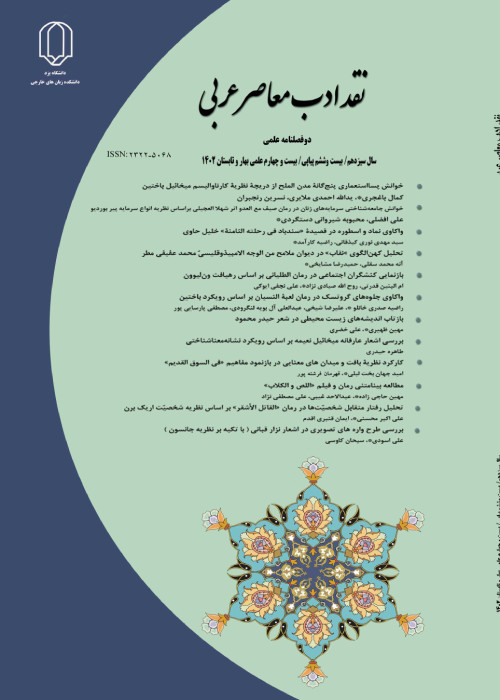Investigation of social harms in Ali Badr's novel Al-Kafereh based on Durkheim's theory: A case study of suicide
Émile Durkheim was the first sociologist to introduce suicide (as a social phenomenon) to sociology from the realm of individual and psychology. He studied the rate of suicide as a social harm in the context of individual's relationship with the group and concluded that social situations are the main reason for people within a community to commit self-destruction. As he also found, attempts to directly convince them to avoid this suicidal act is futile because the real motives lie in the context of the society. In his novel Al-Kafareh (the infidel woman), Ali Badr, a contemporary Iraqi writer, attempts to portray the current perturbed conditions in Iraq in the form of a story of a woman named Fatima whose father and brother were influenced by the takfiri ideology of ISIL and committed suicide. She commits suicide roo after suffering the pain of immigration and asylum to Europe. It seems that this social harm can be analyzed in the light of Durkheim’s theory. To explain the causes of social harms such as suicide in different groups of the current Iraqi society, this paper analyzes the novel Al-Kafareh and criticizes the author's analytical views based on Durkheim's sociological theories to answer the questions a) what is the relationship between the suicide of an individual and group social events in the novel Al-Kafareh? and b) In terms of adaptation, to what extent is the attempt to self-destruct by the characters of the story consistent with Durkheim's theory? Undoubtedly, the answers to these questions can significantly explain the socially harmful factors and be effective in conveying the author's awareness to the audience in the world of fiction.
The research method of this study is qualitative and descriptive using content analysis. Content analysis is done in a systematic way to objectively, qualitatively and systematically describe the content and concepts of written texts. The authors' approach in this paper is sociological criticism of the content (sociological themes) to explain and criticize the author's critical view based on Durkheim's sociological theories. To achieve this goal, the required data on Durkheim's theory and social harms were first collected by a library method with a focus on suicide. Afterward, the novel was reread and analyzed and a network of themes through content analysis as well as extraction of textual evidence. An attempt was also made to divide the analytical part of the article into four parts based on the suicide types and according to Durkheim. Thus, each example was analyzed under its subcategory by matching the text to the theory.
Durkheim divides suicide into four types according to the relationship of the self-destructive individual with the group. They include Egoistic (selfish), Altruistic (unselfish), Anomic (anomalous) and Fatalistic (coincidental). In the light of studying the relationship between the suicide of the characters in the story with social realities such as integration and regularity (social control), the research findings suggest that there is no coherence between individuals in a small institution such as family nor in the wider circle of group or society, which leads to egoistic or altruistic suicide of the characters in the story. The coherence between man and woman is weak and unfounded in the Iraqi society because it is a patriarchal society, such that the perceived class differences as well as the lack of equal access to economic and social capital has eased the links of individual with the group and paved the way for egoistic suicide. It can be said that those connected to the ISIS group have mechanical solidarity and that their suicide operations are classified as altruistic suicide.
The novel Al-Kafareh has several social and critical aspects, and the author depicts social themes through a dramatic familiar narrative style. Representation of such anomalies in the society can give collective activists the necessary insight and self-awareness and, accordingly, the social critic can scrutinize different aspects of the society in a literary work. All the elements of the novel are closely related to the Iraqi society and its relationships. The main theme of this novel is suffering, which includes various physical and psychological forms resulting from the rupture of human relations, the tense situation in the family and society, economic and social pressures, the disturbed conditions of women in the society, and so on. By mentioning these issues, the author seeks to show the turmoil in the Iraqi society, and, by depicting family and social relationships, he illustrates social gaps. To account for the suicide of the novel's characters according to Durkheim's theory, incoherence and insecure situations can be considered as contributing factors. The novel classifis the suicide of Sophia, her spouse, and Adrian’s father as anomic, egoistic and fatalistic, respectively.
Durkheim , Suicide , Ali Badr , Infidelity
- حق عضویت دریافتی صرف حمایت از نشریات عضو و نگهداری، تکمیل و توسعه مگیران میشود.
- پرداخت حق اشتراک و دانلود مقالات اجازه بازنشر آن در سایر رسانههای چاپی و دیجیتال را به کاربر نمیدهد.



